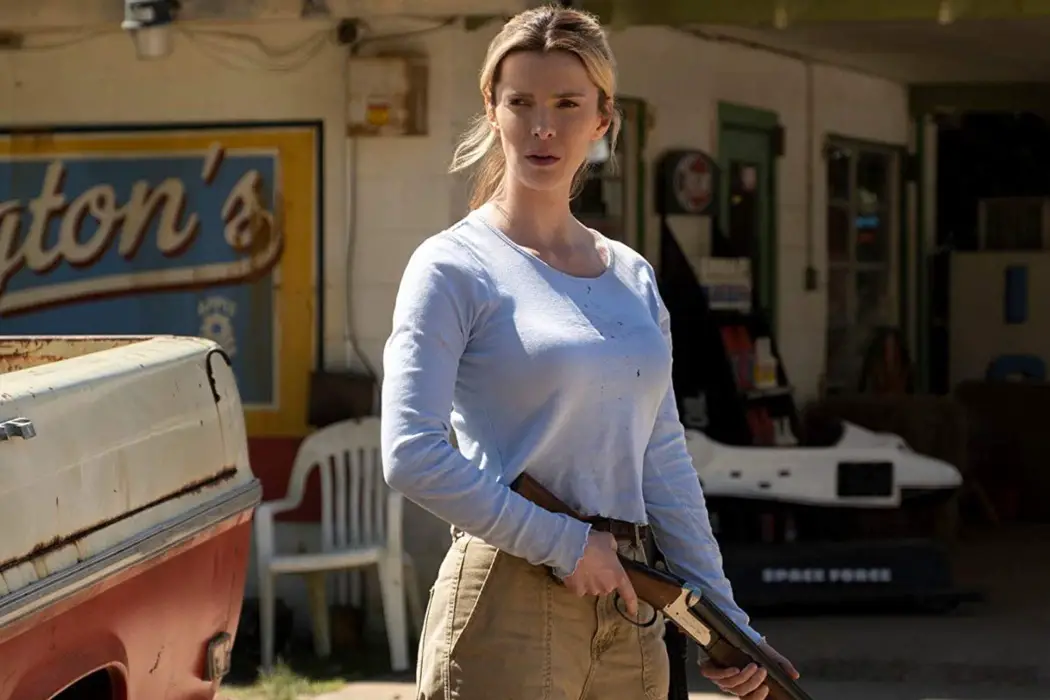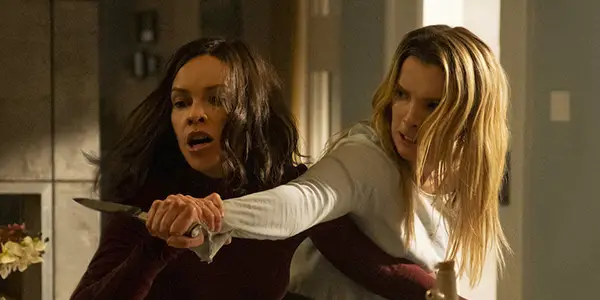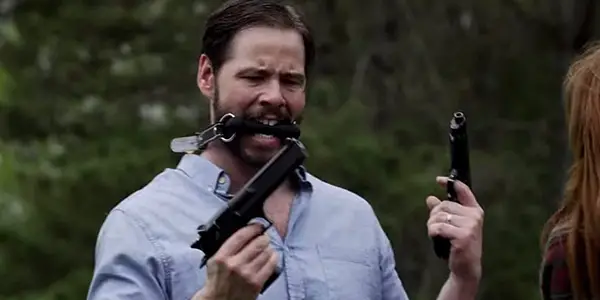THE HUNT: The Guns Don’t Misfire, But Everything Else Does

Digital Media Program Coordinator and Professor at Southern Utah University…
The Hunt was clearly meant to be a tongue-in-cheek satire commenting on the nature of political argument using over-the-top violence couched within a ridiculous premise. The violence was indeed over-the-top, and the premise was indeed ridiculous, but the satire missed its target.
The Chicken or the Egg – The Concept or the Story
“Story is king.”
Cliché? Perhaps. Many clichés outlive their usefulness, becoming little more than halfhearted justifications for outdated methodology. But some clichés transcend trial and error, standing the test of time and proving themselves true over and over again. “Story is king” is very much the latter. This simple phrase is the ultimate master to which all filmmakers are beholden. It is the single greatest measure of what separates the great from the mediocre. It is also the single greatest reason why The Hunt fails in what its creators insist it is supposed to do.
There’s a reason we use the word “storytellers” (STORY-tellers) to refer, as a blanket statement, to those who create, adapt, and/or deliver a story, filmic or otherwise. Finding the right balance between the story and the concept is critical in crafting an effective narrative in any film. No matter how “high concept” the film may be, that concept is easily lost if the story is not given its due.

There is no single answer to the question of balance between story and concept. Each film is unique, with its own distinct elements, its own “sweet spot” in the balance between both considerations. It is the job of storytellers to find that balance, but without exception, the largest slice of the proverbial pie must be labeled “Story.”
Indeed, some of the most “controversial” films in history have earned their place among the greatest of the genre’s offerings precisely because the story came first. The balance is particularly difficult to strike if the concept or the story (or both) is charged. Indeed, for many of these great films, the storytellers’ delicate treatment of the controversy lent to the brilliance of the piece. Think A Clockwork Orange, Network, Do the Right Thing, Dr. Strangelove, Y Tu Mamá También, or more recently, Joker and Parasite. These films found genius in the story. The brilliance of the commentary on the controversy came about naturally, directly because the story was given its due. The Hunt tried to strike that balance, but there are many reasons why it missed the mark.
Shortfalls in Craft
Politics aside, The Hunt is, put simply, a mess of a film. Many of the cuts don’t work well, and the jumps between moments spent with the hunters or the hunted, or between flashback and present day, are jarring at best. It’s as though the movie thinks itself profound enough to gloss over the small (but critical) filmmaking elements that help form a series of disparate shots and scenes into a cohesive, smooth experience. The cuts are awkward, and the story is overburdened. Again, The Hunt is a textbook example of trying to force a story into a concept, rather than giving the story its due.
Supporters may attempt to defend the awkwardness of the film as intentional, something meant to further cement its commentary on the awkward nature of political infighting. This argument fails for two reasons: first, any choices made in calling attention to filmmaking techniques must be justified by the story (think Spaceballs), and second, the film itself must be compelling on its own merits in order to justify flirting with the fourth wall (think Goodfellas or The Big Short). Again, The Hunt fails to succeed in either of these measures.
Nothing in the film is earned, either within the world of the story or as the political farce it aspires to be. In terms of crafting a farce, it’s very clear from the beginning that director and writers Craig Zobel, Nick Cuse, and Damen Lindelof think themselves clever and inspired, and their hubris bleeds through into every shot. They shortsightedly assumed the film’s dialogue, humor, gore, and story was justified based solely on the reasoning that they were “commenting” on the political situation in the real world.

Even within the world of the movie, very little of the dialogue is earned, as the viewer is never really given a good reason to buy into the so-called “stakes” the characters face. Consequently, the “humor” that is supposed to make the film palatable instead comes across as stale. I’ve seen high school film projects with more genuinely earned humor. Much of the defense from The Hunt’s supporters runs something along the lines of “but we make fun of both sides equally!” And yet, making fun of something simply for the sake of making fun of it, rather than having it justified within the world of the film, is one of the greatest sins of storytelling, akin to clumsy exposition.
Instead of being natural, the humor is ham-fisted. Instead of being profound, the dialogue is stagnant. Stories need believable justification. Rather than finding and earning that justification, The Hunt wastes time presenting an endless series of characters meant to represent different political talking points, allowing them to rant about their individual quirks (easily the worst exposition since Suicide Squad), and then killing them off, one by one. The creators wrote out a list of stereotypes, and, thinking they were clever, built a movie around it, throwing in a bunch of gore and “humor,” and expected everyone to stand up and cheer.
The Mockery of a Very Real Problem
You know those assholes who say they can’t help but laugh every time they see someone fall on their face? That jerk back in high school who loved nothing more than to laugh at someone else’s pain? The kind of person who sees a burning building, and before they even stop to wonder if someone might be trapped inside, can’t help but laugh at the “craziness” of what they’re seeing? Welcome to The Hunt, a movie that looks at a very real and very dangerous problem, one that has cost lives, and chooses to laugh, throwing an extra match into the fire just for fun.
I’m not against targeted farce or aggressive humor. I agree that many of the political talking points on both sides often get ridiculous. I too have a serious problem with the fact that we talk in circles; that one pundit says one thing, and the next chooses to attack on a completely different vein rather than try to answer and reconcile what the first pundit just finished saying. But unlike the filmmakers behind this movie, I don’t choose to step away from these problems, point the finger, and laugh. I try to remain cognizant of the fact that there are very real people trapped inside this burning building.
Some may say that political humor on Colbert, The Daily Show, or SNL does the same thing The Hunt does: make light of the detrimental aspects of human nature, reminding us to laugh at ourselves but failing to suggest real avenues of change. Unlike The Hunt, however, these shows do not dress up the Hyde of humanity in copious gore and mislabeled “humor” amounting to little more than a middle finger.
The difference? Programs like The Daily Show choose to be smart, asking their audience to do the same. Films like The Hunt, on the other hand, try to celebrate the more regressive aspects of humanity, laughing for the sake of laughing, and asking the audience to remain ignorant. That asshole who laughs when someone falls on the street, who laughs at someone else’s pain, is outing themselves as one who has never attained any semblance of emotional maturity. That, in every way, is what you get with The Hunt.

The vast majority of The Hunt’s positive critical reviews justify their defense of the film by taking the artistic censorship tack. I’ve seen it be compared to such great films as The Life of Brian or A Clockwork Orange, solely based on the fact that those films were also decried for their controversial topics. There’s a crucial difference, however: those films were smart. They were good. They were a testament to the brilliance of their creators; filmmakers who understood the balance in making satirical commentary in film. While I agree that this movie (or any artistic work, for that matter) should not have been delayed nor targeted for censorship, defending it simply because it was targeted is a misstep, at best.
The Hunt tries to deliver a message along the lines of “You’re all stupid. You over on that side are just as stupid as those over on the other side. All this fighting is stupid.” In the end, however, the only message that actually comes across is the implication that anyone who chooses to defend a political ideology is engaging in a pointless cause. It’s a movie that comments on the pointlessness of commenting, tossing more cacophony into what it insinuates is nothing more than a blob of cacophony. This supposedly “profound” piece of art will simply dissolve into so much noise, while those trying to make a difference will continue to do so, and hope for change.
Still, it was Oscar Wilde, easily among history’s greatest masters of well-placed satirical commentary within a story, that said: “The only thing worse than being talked about is not being talked about.” And here I am, talking about The Hunt. So, in that basest of all measurements… mission accomplished, I guess?
Did The Hunt misfire? Does the commentary it tries to make justify the means, even if messy? Let us know what you think!
The Hunt was released in theaters in the UK on March 11, 2020 and in theaters in the US on March 13, 2020. For all international release dates, see here.
Does content like this matter to you?
Become a Member and support film journalism. Unlock access to all of Film Inquiry`s great articles. Join a community of like-minded readers who are passionate about cinema - get access to our private members Network, give back to independent filmmakers, and more.
Digital Media Program Coordinator and Professor at Southern Utah University and Southwest Technical College; M.Ed.; Author at Labyrinth Learning and Film Inquiry. Passionate educator of film theory and history. World-class nerd with a wide array of interests and a deep love for many different fandoms.













